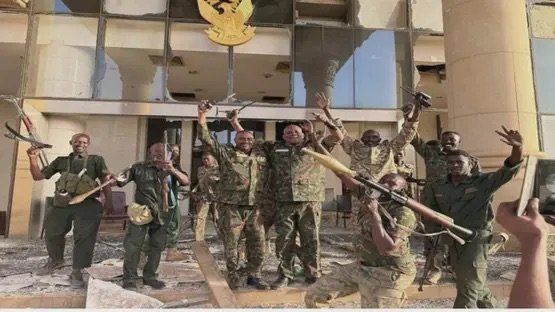Sudan’s military announced on Friday that it had seized control of the Republican Palace in Khartoum, the last major stronghold of the rival paramilitary Rapid Support Forces (RSF) in the capital. The capture of this historic site, long considered a symbol of power in Sudan, marks a significant victory for the military after nearly two years of conflict.
A Symbolic and Strategic Victory
The Republican Palace, a landmark located along the Nile River, has been a focal point of Sudanese governance for decades. Its image is featured on banknotes and postage stamps, making its capture both a strategic and symbolic milestone for the army. In recent months, the military, led by Gen. Abdel-Fattah Burhan, has steadily regained territory from the RSF, gradually pushing the paramilitary group out of Khartoum.
Videos circulating on social media showed soldiers inside the palace, confirming their presence and marking the occasion as the 21st day of Ramadan. A Sudanese officer in the footage announced the takeover, while soldiers—armed with rifles and rocket-propelled grenades—chanted, “God is the greatest!” The palace itself appeared heavily damaged, with debris crunching beneath the soldiers’ boots.
Sudan’s Information Minister, Khaled al-Aiser, confirmed the news in a post on X, stating, “Today, the flag is raised, the palace is back, and the journey continues until victory is complete.”
Despite this success, the war is far from over. The RSF, commanded by Gen. Mohammed Hamdan Dagalo, still controls large swaths of Sudan, particularly in the western Darfur region. Sporadic gunfire could still be heard across Khartoum on Friday, though it was unclear whether it was due to ongoing clashes or celebratory gunfire.
Fighting Continues Across Sudan
While the Sudanese army now holds key government buildings and the surrounding Arab Market, the RSF remains entrenched in other critical locations, including Khartoum International Airport, which they have controlled since the war broke out in April 2023.
In a statement, the RSF acknowledged the loss of the Republican Palace but insisted that its forces were still active in the area and engaged in battle. The group reportedly launched a drone attack on the palace, resulting in casualties among soldiers and journalists working for Sudanese state television.
Meanwhile, fighting has escalated in North Darfur. Late Thursday, the RSF claimed it had seized control of the desert city of al-Maliha, a key location near the borders of Chad and Libya. The Sudanese military confirmed battles in the area but has not officially admitted losing the city. Al-Maliha lies about 125 miles (200 km) north of El Fasher, one of the last government-held strongholds in Darfur, which has been subjected to relentless attacks from the RSF.
A Humanitarian Crisis Deepens
The conflict in Sudan has led to what the United Nations describes as the world’s worst humanitarian crisis. Over 28,000 people have been killed, while millions have been displaced. Entire communities are facing famine, with reports of some families resorting to eating grass in a desperate attempt to survive.
The situation has been made worse by the looting of humanitarian aid. On Friday, UNICEF condemned the theft of food supplies meant for malnourished children at Al Bashir Hospital on the outskirts of Khartoum. “Commercial supplies and humanitarian aid have been blocked for over three months due to ongoing conflict along key routes,” UNICEF stated. “This has created a severe shortage of food, medicine, and other essentials, leaving thousands of civilians trapped in active combat zones.”
A Nation in Turmoil
Sudan has been in a state of political instability since the ousting of longtime ruler Omar al-Bashir in 2019. A brief transition toward democracy was derailed in 2021 when Burhan and Dagalo staged a military coup, setting the stage for the current conflict.
The RSF, originally formed from the notorious Janjaweed militia, was accused of committing war crimes in Darfur in the early 2000s under al-Bashir’s rule. Today, human rights organizations and the UN have accused both the RSF and the Sudanese military of committing atrocities, including attacks on ethnic African communities.
Before leaving office, former U.S. President Joe Biden’s administration officially labeled the RSF’s actions as genocide. Both sides, however, continue to deny allegations of war crimes.
What’s Next?
Although the capture of the Republican Palace is a major victory for Sudan’s military, it does not signal an end to the war. The RSF remains a formidable force, particularly in Darfur and other contested areas. For the millions of Sudanese civilians caught in the crossfire, peace remains a distant hope.

 English
English



























































